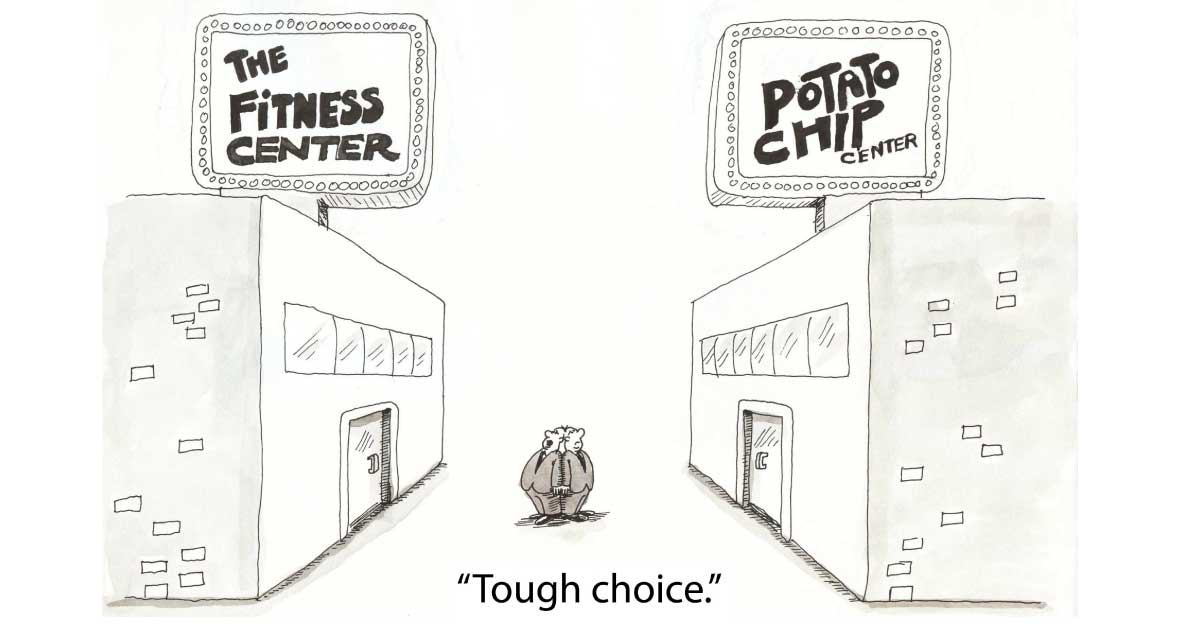Great decision-makers use the power of habits

Tap into the power of habits and free up your mental resources for your most important decisions
On a recent morning, while enjoying a cup of coffee, one of us looked out the window at the weather and deliberated on whether to go for a short jog now or wait until later in the day when it was a bit warmer. You can probably guess what happened after that. The day took on a life of its own, soon it was evening, and the jog never happened. Some variation on this same theme happens frequently.
This arguably important decision about health and mental well-being, because it wasn’t wired into a daily routine, ended up being a decision that didn’t happen.
Great decision-makers have a better strategy. They tap into the power of habits. Instead of making an everyday “game-time” decision, they make a single decision up front to form a hardwired routine.
Once the desired behavior or activity becomes a habit, it’s no longer in the realm of back-and-forth deliberation each day. It’s just something you do without consciously needing to decide to do it.
Not only do great decision-makers hardwire positive and healthy behaviors into habits, greatly increasing the likelihood that the behaviors happen, in doing so they also free up precious mental resources for other important decisions during the day.
We live in a world where we need to make hundreds of decisions each day about things we want to do and don’t want to do, and where procrastination and decision fatigue are real challenges.
Great decision-makers use the power of habits to increase their decision-making mojo by hardwiring the optimal decision every time and thus preserving mental resources for the big, creative decisions that require mental focus. They make the decision once and then burn it into their routines.
It could be drinking a full glass of water first thing in the morning before that first cup of coffee, or meditating each day for 3 minutes, or doing a few quick squats or stretches, or free writing in a journal, or giving your kids a big hug each evening, or any number of small but potent positive behaviors. We just make the decision once, to turn the behavior into a habit, versus making the decision anew each time.
5 ways to activate the power of habits
So how do we systematize simple repetitive decisions in this way? Here are 5 tips from our Decision Mojo workshop you might try when attempting to hardwire a daily decision into a habit.
1. Focus on the short-term reward
One of the challenges of the habit-forming decision is the time-delay between payoffs. When the alarm clock startles you at 6am, the reward of hitting the snooze button and remaining in your warm bed is obvious and immediate, while the reward of daily exercise accumulates slowly over time and only become obvious in the long-term. It is much easier to just hit the snooze button than to get out of the warm bed and pound your Nikes into the pavement.
James Clear, the author of Atomic Habits, refers to this phenomenon:
Habits are the compound interest of self-improvement. The same way that money multiplies through compound interest, the effects of your habits multiply as you repeat them. They seem to make little difference on any given day and yet the impact they deliver over the months and years can be enormous.”
The long-term benefits of forming a new habit are often most compelling when we are in a reflective state, thinking about life’s goals. But when we are lying in bed contemplating whether to go for a run, the benefits to our future self 10 years down the road just aren’t that compelling. We need to find a more immediate reward.
In the case of going for a jog, we know we’ll feel a sense of accomplishment immediately upon finishing. Plus, the endorphins released in our brains during the exercise will give us an energy boost and help us stay mentally sharp throughout the day. So instead of focusing 10 years in the future, focus on the short term – the sense of accomplishment you’ll feel after the run, and the endorphin release it will provide.
2. Make it tiny
BJ Fogg, author of Tiny Habits, says we frequently struggle to develop a new habit because we are too ambitious and start too big. We think that we have to start the jogging habit by going out for a 3-mile run each morning. Instead, identify a micro behavior first and turn that into a habit. Start with a 2-minute jog in place, or a fast walk around the block. And then once that is a habit, jog for 3 minutes, or do a fast walk around 2 blocks.
3. Create an anchor
When we’re trying to establish a healthy new habit, we want to reduce the decision friction by making the positive choice as seamless and automatic as possible. When the alarm rings and we’ve deliberately placed our running shoes and clothes next to the bed the night before, it’s that much easier to overcome inertia and get out the door. When it comes to eating well, cut your vegetables and have them ready to access in the fridge, and place all the chips and cookies in the garage, or on a shelf out of easy reach. Fogg describes anchors as something that happens reliably in your life, and as a result, something you can easily attach a potential new habit to.
4. Celebrate success
According to Fogg, one of the single most powerful means to hardwire a new habit is to create a simple mini celebration each time you do the behavior. It could be just a fist pump, or a quiet, personal “woo hoo!” or a quick humming of Queen’s “We are the Champions” main verse. No matter, small or large celebrations produce a quick burst of endorphins, which increases the desire to do the behavior again, and again, and again. We change best by feeling good, not bad.
5. Use the 'no alternative' approach
Jerry Seinfeld learned early in his career that the practice of writing – in his case, writing jokes – was critical for his success, yet he found the act of writing very difficult. We can relate to Seinfeld’s attitude toward writing. It’s not easy to sit down at a desk with a blank sheet of paper and write. It can be terrifying. It’s much easier to come up with an excuse for why now is not the best time to write. So, to overcome the natural resistance to writing, Seinfeld developed a routine.
“I still have a writing session every day. It’s another thing that organizes your mind. The coffee goes here. The pad goes here. The notes go here. My writing technique is just: You can’t do anything else. You don’t have to write, but you can’t do anything else.”
Seinfeld removes all distractions so the decision to write or not becomes very simple. Either write or suffer being alone in a room doing nothing.
Habits support good decision-making
Good decision-makers look for ways to reduce the number of decisions they have to make each day, so they can apply maximum focus and energy to each decision. Jeff Bezos, the CEO of Amazon, talks about the number of critical business decisions he makes each day and his answer is revealing:
“Why do I need to make a hundred decisions today? If I make three good decisions a day, that’s enough. And they should just be as high a quality as I can make them.”
He also schedules his day so that he makes those decisions when he’s in the optimal physical and mental state to do so:
“That’s why I set my first meeting for 10 o’clock. I like to do my high-IQ meetings before lunch. Anything that’s going to be really mentally challenging, that’s a 10 o’clock meeting. Because by 5 pm, I’m like, 'I can’t think about that today, let’s try this again tomorrow at 10am.' ”
To reduce decision fatigue and preserve your energy to focus on your highest-impact decisions, look for ways to automate as many small positive decisions as possible by turning them into habits. Plus, through the power of habits, you’ll get compounding interest on the decisions, and you’ll also be much better prepared to make a quality decision when it counts.
Diagnose a decision
Could you be falling into one or more common decision-making traps? Take a complimentary Decision Mojo™ Decision Diagnostic to find out!

